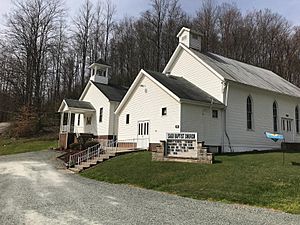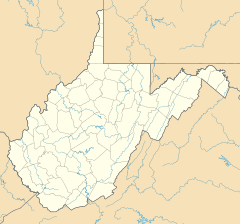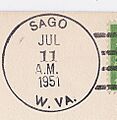Sago, West Virginia facts for kids
Quick facts for kids
Sago
|
|
|---|---|

Sago West Virginia Baptist church
|
|
| Country | United States |
| State | West Virginia |
| County | Upshur |
| Time zone | UTC-5 (Eastern (EST)) |
| • Summer (DST) | UTC-4 (EDT) |
| GNIS feature ID | 1555552 |
Sago /ˈseɪɡoʊ/ is a small, unincorporated community. It is located in Upshur County, West Virginia, in the United States. Sago sits right along the Buckhannon River. The community was named by a cattleman, but the reason is not known.
The Sago Baptist Church is also in Sago. This church has been a very important place for the community for many years.
Contents
Exploring Sago's Natural Beauty
Location and River Features
Sago is beautifully located next to the Buckhannon River. This river is known for its clear water and fast flow. It is surrounded by pretty hills.
Plants and Winter Scenery
The riverbanks are covered with hemlock trees and rhododendrons. The rhododendron is the state flower of West Virginia. In winter, the area looks amazing. Snow covers the plants, and ice floats in the river. This creates a truly stunning natural picture.
Sago's Early History and First Settlers
Founding Families and Community Growth
The first people to settle permanently in Sago arrived in 1801. Zedekiah Morgan came from Newtown, Connecticut, with his family. This was the start of Sago becoming a settled community. Other families, like the Morgans and Buntens, soon followed. They all helped Sago grow and become established.
Important Railroads and Local Economy
Two important railroads helped Sago develop. The Baltimore and Ohio Railroad and its branch, the Coal and Coke Railroad, were built here. These railroads made it easier to transport goods. They helped the local economy by supporting coal mining and timber operations.
The Morgan Family's Impact
Settling and Expanding the Area
Zedekiah Morgan started the settlement near where the Coal and Coke railroad bridge is now. His sons, Joshua and Ezra Morgan, and their families, helped expand the community. They worked on farms and built important structures.
Contributions to Sago's Community
The Morgan family played a big part in Sago's development. They built homes and farms. They also helped establish the local Baptist church. Their actions shaped both the physical and moral parts of Sago. Their descendants continued to be important in the area. They worked in many different jobs and community roles.
The Bunten and Moore Families
James Bunten's Industrial Innovations
James Bunten married into the Morgan family. He brought new ideas to Sago's industries. He built mills that could saw lumber and grind grain. These mills were very important for the community. They helped Sago become self-sufficient and grow its economy.
The Moore Family's Service and Leadership
The Moore family also made important contributions. People like James Levin and Lorenzo Byron Moore served in the military. They fought in the Civil War. After the war, they took on important community roles. They worked in education and as ministers in different states.
Community Buildings and Services
Sago Baptist Church and Schools
The Sago Baptist Church was founded in the mid-1800s. It was a central part of community life. It helped with spiritual education and moral development. Schools also grew in Sago. They started as "subscription schools," where families paid for lessons. Later, they became "free schools." Many people from Sago became important educators. They helped improve education in the wider region.
Later Developments and Modern Sago
Industry and Social Progress
Sago continued to grow through the 1800s and early 1900s. More advanced industries were started. These included gristmills for grinding grain and wool carding machines. Railroads also continued to expand. These developments helped Sago grow and connect with bigger economic systems. This set the stage for the community to continue to do well.
Sago's Lasting Cultural Legacy
Sago's history shows how it kept its strong community spirit. It also adapted to economic and social changes over many years. The community's strength and the stories of its families show a rich history. This history is still celebrated and remembered by people today.
Images for kids
 | William L. Dawson |
 | W. E. B. Du Bois |
 | Harry Belafonte |





